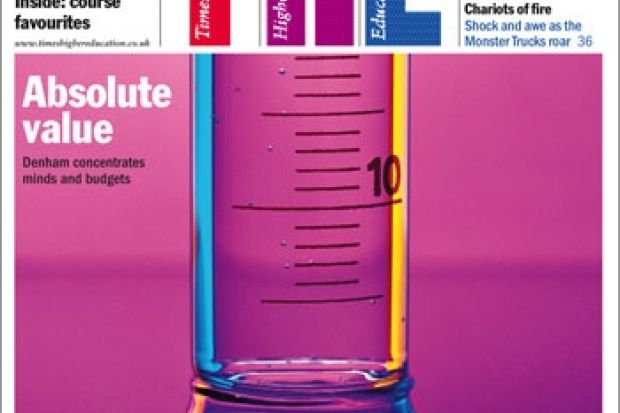The Government is determined to concentrate research funding on a small elite of institutions despite the fact that the 2008 research assessment exercise revealed that excellence is spread much more widely throughout the sector than previously thought.
In an interview with Times Higher Education, Mr Denham set out his initial thinking on a range of issues before the publication of "a new framework for higher education" for the next 10 to 15 years.
The framework, which is scheduled to be unveiled this summer, will form the backdrop to the review of undergraduate tuition fees later this year.
He made it clear that continued concentration of research funding was the key to ensuring that the UK's university system remained "world class".
The most surprising element of the 2008 RAE, whose results were published in December, was that "world-leading" research was identified in 150 of the 159 institutions that entered, at least in small "pockets of excellence".
This is likely to lead to a thinner spread of quality-related (QR) research cash when university funding allocations are published in Times Higher Education on 5 March.
But Mr Denham said that while there should be a "fair settlement all round" next week, the sector should not expect the further spread of funding in the future.
He warned that the pockets of excellence in largely teaching-led universities should not expect to grow.
"I am minded to conclude that in the future we do need a significant concentration of research activity. I don't see the future as a step-by-step dilution (or) spread of research activity," he said.
"We should recognise (pockets of excellence in the current RAE), but we shouldn't be sending the message that we expect them to grow the next time around and the next time around (after that) so that everything gradually gets spread out, because I do not think that is the right strategy."
Mr Denham said there were two models for QR funding: gradually spreading research over lots of universities or settling on a level of concentration "perhaps not dissimilar to what we have at the moment". He said: "Which of those is most likely to be seen as a world-class research system? I would say ... it is the one with the concentrated research."
In a government-organised "HE debate" in London on 24 February, Mr Denham said that while concentration would support the "critical mass of leading researchers and expensive facilities" the UK needed, he added that "we should firmly reject any idea of creating an artificial, strict separation between research institutions and non-research institutions".
He declined to be drawn on details of how the replacement for the RAE - to be known as the research excellence framework - would work, but said it would have to be based on "excellence" rather than "designation", and that collaboration between universities with pockets of excellence and those that demonstrated it over a wider range of disciplines was "critical".
He ruled out abandoning the research profiles that highlighted institutions' strengths across the board, used for the first time in the 2008 RAE.
More info
To read Mr Denham’s full speech, go to:
www.dius.gov.uk/speeches/denham_he_debate_240209.html
To read the 14 review reports, go to:
Register to continue
Why register?
- Registration is free and only takes a moment
- Once registered, you can read 3 articles a month
- Sign up for our newsletter
Subscribe
Or subscribe for unlimited access to:
- Unlimited access to news, views, insights & reviews
- Digital editions
- Digital access to THE’s university and college rankings analysis
Already registered or a current subscriber?
